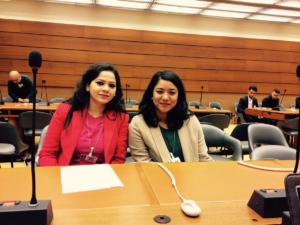Young Dalit activists played an active role at the 2017 Forum on Minority Issues, which took place in Geneva from 30 November to 1 December. Dalit women from Nepal and India, forming part of an IDSN delegation, gave powerful presentations under the theme of Minority youth: towards diverse and inclusive societies. They explained to participants how deeply ingrained caste-based discrimination continues to pose severe obstacles to equal participation in most aspects of life and how social media offers both new opportunities for change and new challenges.

Anju also explained how digital tools were giving increased exposure to Dalits as traditional media narratives continue to be controlled by dominant caste groups in society and are not representing Dalit voices adequately. She also touched upon the many challenges in relation to harassment and the personal security of the women engaging with social media, as well as the lack of access to being online and the necessary tools for many Dalits.
“In spite of all these challenges, we must use social media so that the whole world can know and see what is happening with Dalit communities, that’s why we decide not to leave but take measures to overcome these challenges. We have to use these social media to reach out to the world,” Anju asserted.
Ankita, speaking on behalf of the Feminist Dalit Organisation (FEDO) in Nepal, gave statements on inclusive education and participation of minority youth in public life. Ankita’s statements pointed towards structural caste-based discrimination and socially ingrained stigmatisation as the key obstacles to Dalits receiving education on par with non-Dalits and to their enjoyment of equal participation in public life.
“Dalits need to be protected by the full implementation of anti-untouchability legislation. This will not change mind-sets overnight but over time behaviour will change.” Ankita stated.
She furthermore pointed out that Dalit women were even more at risk of exclusion, discrimination and abuse as they face multiple discrimination on account of their gender and their caste.
In addition to this UN Minority Fellow, Chet Narayan, Chairman of the Dalit Youth Alliance in Nepal gave a presentation on the general state of caste-based discrimination in Nepal.
”I have been particularly touched in these two days when I heard about the situations of some of the world’s most vulnerable and marginalised minorities.” Said the UN Special Rapporteur on Minority Issues, Dr Fernand de Varennes, summing up the Forum.
”In particular when you shared your experiences of double or triple marginalisation of young women from Dalit, Rohingya or Roma communities, facing exclusion, discrimination and even violence in their lives to the degree, which I think, most of us would have difficulty comprehending.”
Read the full statements by Ankita
